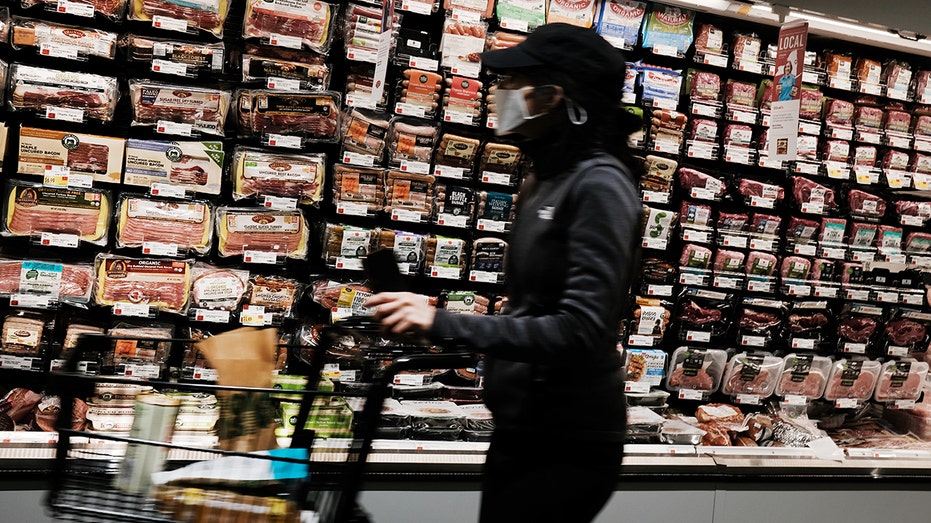Consumer confidence sinks to 11-year low in May as inflation rages
Inflation has pushed consumer confidence to the lowest level since 2013
Americans facing record inflation rates, gas prices
'Kennedy' party panel reacts to President Biden's 'economic blunders' as inflation hit 8.3% in April.
U.S. consumer confidence tumbled more than expected to a fresh 11-year low in early May, reflecting heightened concerns among Americans about the hottest inflation in a generation.
The University of Michigan’s consumer sentiment index fell to 59.1 in May – down sharply from the April reading of 65.2 and well below economists' forecast for a reading of 64. That's a more than 28% drop from just one year ago, when the gauge was at 82.9.
INFLATION SOARS 8.3% IN APRIL, HOVERING NEAR 40-YEAR HIGH
It marks the lowest reading for the gauge since 2013.
"Inflation remains on the forefront of consumers’ minds," Joanne Hsu, director of the survey, said in a statement. "They mentioned inflation throughout the survey, whether the questions referred to their own personal financial situations, their outlook for the economy, or buying conditions."

People shop at a grocery store on May 12, 2022, in New York City. (Spencer Platt/Getty Images / Getty Images)
Consumers expect prices to rise 5.4% over the next year, remaining near a four-decade high for the third consecutive month. Americans believe prices will rise at an annual rate of 3% over the next five to 10 years, which is unchanged since April.
Americans' view of their financial situation is also at the lowest level since 2013, according to the survey. More than half of respondents expect inflation to erode their income over the next year.
"Consumer sentiment took a substantial hit this month, as worries over inflation’s drag on the economy grew," said Robert Frick, corporate economist at the Navy Federal Credit Union. "But consumer spending keeps rising, and with savings high, household debt low and the jobs market strong, that spending should continue until the economy falters."
Inflation accelerated again in April, the Labor Department reported on Wednesday, with the consumer price index rising by 8.3%. While that's down a bit from the 41-year high notched in March, it was much higher than economists expected and underscores that inflationary pressures in the economy remain strong.
Rising inflation is eating away at strong wage gains that American workers have seen in recent months: Real average hourly earnings decreased 0.1% in April from the previous month, as the inflation increase eroded the 0.3% total wage gain, according to the Labor Department. On an annual basis, real earnings actually dropped 2.6% in April.
The inflation spike has created a political headache for President Biden, who has seen his approval rating plunge as consumer prices rise. It has also forced the Federal Reserve to embark on the most ambitious policy tightening mission in decades: Policymakers raised the benchmark interest rate by 50 basis points in May for the first time since 2000, and have signaled that similarly sized hikes are on the table at coming meetings as they seek to tame inflation.
"Inflation is much too high, and we understand the hardship it is causing, and we are moving expeditiously to bring it back down," Fed Chairman Jerome Powell told reporters last week. "Assuming that economic and financial conditions evolve in line with expectations, there is a broad sense on the committee that additional 50 basis point increases should be on the table at the next couple of meetings."
The concern now is that the Fed may inadvertently drag the economy into a recession with its aggressive rate hike course. Bank of America, Fannie Mae and Deutsche Bank are among the Wall Street firms forecasting a downturn within the next two years, which has further rattled investors and markets.

Federal Reserve Chair Jerome Powell pauses during a news conference in Washington in Jan. 29, 2020. (AP Photo/Manuel Balce Ceneta, File / AP Newsroom)
Powell conceded on Thursday that achieving the elusive "soft landing" – the sweet spot between cooling consumer demand without crushing economic growth – could prove tricky.
GET FOX BUSINESS ON THE GO BY CLICKING HERE
"So it will be challenging, it won’t be easy," Powell said during an interview Thursday on NPR's "Marketplace." "No one here thinks that it will be easy. Nonetheless, we think there are pathways ... for us to get there."





















